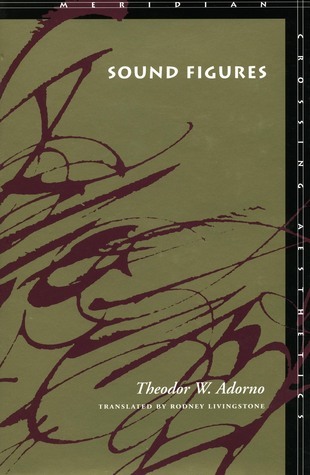

Sound Figures
Theodor W. Adorno, Rodney Livingstone
4.33(12 readers)
Theodor Adorno is one of this century's most influential thinkers in the areas of social theory, philosophy, aesthetics, and music. Throughout the essays in this book, all of which concern musical matters, he displays an astonishing range of cultural reference, demonstrating that music is invariably social, political, even ethical. Adorno's insistence on the social character of aesthetic works will come as no surprise to those familiar with his writings, although many may be surprised by the volume's somewhat colloquial tone. This colloquialism, in dialogue with Adorno's unceasing rigor, stems from the occasional sources of many of the essays, mainly public lectures and radio addresses. As such, this volume represents an important and, for English-language readers, largely unfamiliar side to Adorno. His arguments move more quickly than in his more formal and extended musicological works, and the writing is much more accessible and generous than his usually dense and frequently opaque prose. This volume includes essays on prominent figures in music (Alban Berg, Anton von Webern, Arturo Toscanini), compositional technique (the prehistory of the twelve-tone row, the function of counterpoint in new music), and the larger questions of musical sociology for which Adorno is most famous, including the relation of interpretation to audience, the ideological function of opera, and the historical meaning of musical technique. The essay on the sociology of music, for example, represents an early statement of what would soon become trademark principles of his mode of musical analysis, serving as a catalyst for his famous study Introduction to the Sociology of Music. Some forty years after most of these essays were written, they remain fresh and relevant. In part, this is because Adorno's method has only recently begun to make substantial inroads into Anglo-American musicology. And the interdisciplinary nature of his thought provides a precursor for today's interdisciplinary studies.
Publisher
Stanford University Press
Publication Date
5/1/1999
ISBN
9780804735575
Pages
248
Categories
About the Author

Theodor W. Adorno
Theodor Wiesengrund Adorno was one of the most important philosophers and social critics in Germany after World War II. Although less well known among anglophone philosophers than his contemporary Hans-Georg Gadamer, Adorno had even greater influence on scholars and intellectuals in postwar Germany. In the 1960s he was the most prominent challenger to both Sir Karl Popper's philosophy of science and Martin Heidegger's philosophy of existence. Jürgen Habermas, Germany's foremost social philosopher after 1970, was Adorno's student and assistant. The scope of Adorno's influence stems from the interdisciplinary character of his research and of the Frankfurt School to which he belonged. It also stems from the thoroughness with which he examined Western philosophical traditions, especially from Kant onward, and the radicalness to his critique of contemporary Western society. He was a seminal social philosopher and a leading member of the first generation of Critical Theory.
Unreliable translations hampered the initial reception of Adorno's published work in English speaking countries. Since the 1990s, however, better translations have appeared, along with newly translated lectures and other posthumous works that are still being published. These materials not only facilitate an emerging assessment of his work in epistemology and ethics but also strengthen an already advanced reception of his work in aesthetics and cultural theory.
Unreliable translations hampered the initial reception of Adorno's published work in English speaking countries. Since the 1990s, however, better translations have appeared, along with newly translated lectures and other posthumous works that are still being published. These materials not only facilitate an emerging assessment of his work in epistemology and ethics but also strengthen an already advanced reception of his work in aesthetics and cultural theory.
Questions & Answers
Reader Reviews
Loading comments...